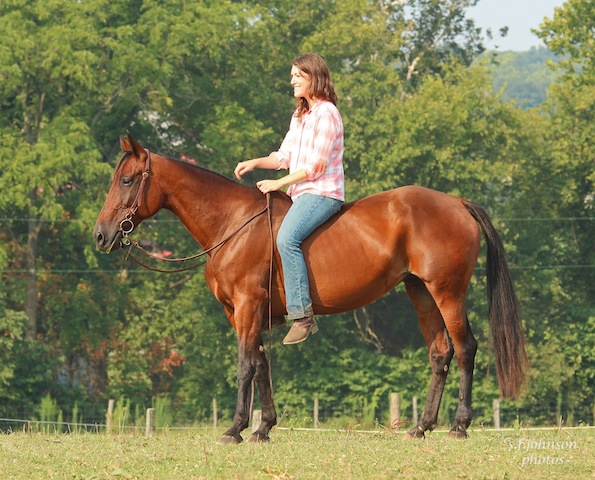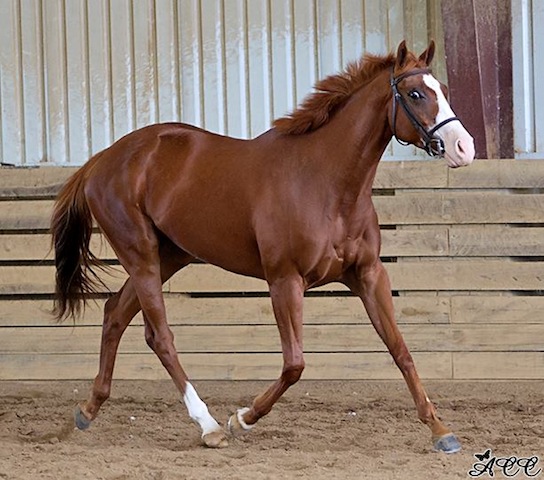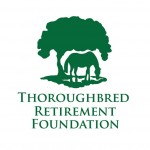
Miss Sweetdreamsofjewel, currently available at New Vocations, is among the OTTBs helped by generous donations. Photos courtesy New Vocations
(Press Release) Some of horseracing’s biggest stars are stepping up to the plate to support New Vocations Racehorse Adoption Program by pledging a percentage of their purse earnings from the 2013 Breeders’ Cup World Championships, according to an Oct. 31 press release from New Vocations Racehorse Adoptions.
For the fifth consecutive year, New Vocations Racehorse Adoption Program is working with trainers and owners of Breeders’ Cup contenders to pledge a percentage of their earnings to support the program’s mission to rehabilitate, retrain, and rehome retired racehorses. In the past four years the Pledge has raised nearly $200,000.
“We are so happy to support such a great cause at this year’s Breeders’ Cup,” says trainer Doug O’Neill who will start nine horses at the World Championships. “There are so many excellent Thoroughbred retirement and adoption organizations out there that care for these great athletes after their racing careers and it’s our responsibility as trainers and owners to support their efforts.”
To date, 30 Championship contenders have owners and or trainers supporting this year’s Pledge. Trainers who have committed to pledge include Bob Baffert, Kiaran McLaughlin, Doug O’Neill, Todd Pletcher, and Leah Gyarmati.
Dogwood Stables with Breeders Cup Classic contender Palace Malice and Padua Stables with Breeders’ Cup Distaff contender Authenticity lead the long list of owners, which also include Conquest Stables, James Covello, Eclipse Thoroughbred Partners, Klaravich Stables, Let’s Go Stable, Kenneth and Sarah Ramsey, Rosedown Racing Stables, Treadway Racing Stable, West Point Thoroughbreds, WinStar Farm ,Wonderland Racing, and Zayat Stables. New Vocations will continue to seek pledges from additional owners and trainers leading up to the November event.
“To us aftercare of a Thoroughbred is just as important as racing them,” Justin Zayat says. “We are horse lovers and when it comes to retiring them it is always our number one priority to find a good and safe home. There are no better people in the business to work with than New Vocations.” Zayat Stables pledged with all three of their contenders including Paynter in the Breeders’ Cup Classic.
New Vocations first opened its doors to retired racehorses looking for new careers in 1992. Starting with a single farm in Dayton, Ohio the program has grown to six facilities in Kentucky, Ohio, Michigan, and Pennsylvania. Serving over 40 racetracks, New Vocations works directly with owners and trainers in need of an aftercare program for horses leaving the track.
Currently, the program leads the nation in racehorse adoptions, taking in over 400 horses a year. The program has a sound adoption system in place that is proven to move a large number of horses in a rather short period of time. Their focus is on adoption verses retirement, believing that retired racehorses that are physically able should have a chance to excel in a second career.
“We feel very blessed to receive so much support from the owners and trainers participating in this year’s campaign,” says New Vocations Program Director, Anna Ford. “The number of horses needing our services is huge and the funds raised from the pledges will help us continue to grow. It is fairly simple, the more money we raise the more horses we can take.”




I was so mad when I watched the Breeders Cup races to see that so many horses after winning races for the 2nd or 3rd time will be sent to auction the next day. How’s that for a reward for years of hard work? Racing industry as a whole is so wrong. I know … we adopted two OTTB sent to New Holland’s killer buyer auction. Many thanks to rescues for all you do.
What is placed is small next to the foals bred every year. What happens to the brood mares that produce all of the foals sold at the yearling sales? Each year these mares crank out foals like a factory assembly line that goes on until they get to old to breed anymore. I have yet to see anything in a article about just what happens to these used up horses? I wonder why? Could it be that they are sold down the river to slaughter?? Why don’t these farms make some effort to train these mares so they might find homes? I believe they take the easy way out and dump them into the slaughter pipeline and don’t think a thing about it because they are just considered a commodity like cattle.
I’ve often wondered too what happens to all these broodmares who can no longer get in foal. I know that some farms (Three Chimneys?) retire them to pasture. But what about all the others? Is it also part of racing’s dirty secret?
I would like to see these wonderful owners and trainers spread the money around to other deserving placement groups. Locally and regionally ALL owners and trainers need to step up to support the horses in their aftercare that have so generously supported them in their careers and in their ownership.